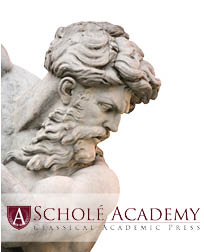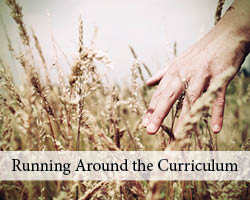
by Christopher Perrin, PhD | Jul 9, 2015 | Articles
The Christian tradition speaks regularly about the importance of ordering one’s affections or desires. Augustine, for example, speaks about an ordo amoris (an order of love) in The City of God. Ignatius speaks of “disordered affections” that cloud our judgment. C. S. Lewis calls upon the ordo amoris to argue for a doctrine of objective value in which we give the appropriate love to every good thing we encounter—waterfalls are loved in one way, people in one way, and God in another.
Jesus often signals an ordo amoris, telling the rich, young ruler there is one thing he lacks (Matt. 19) and telling Martha that though she is busy about many things, Mary has chosen what is best: to converse with him rather than prepare dinner (Luke 10). When Jesus is asked what the greatest commandment is, he responds that there are two: to love God with your whole heart and to love your neighbor as yourself (Matt. 22). Jesus seems to believe that there is a divinely ordered hierarchy of loves and pleasures.
If our loves are to be ordered throughout life, then surely they should be well-ordered in our schools and homeschools. Lewis argues (in The Abolition of Man) that the doctrine of ordo amoris is needed at the most basic level—for unless we believe that there are objective realities that truly merit our admiration and love, we must swim in a sea of subjective relativism that ultimately destroys man himself. The aims and means of education are undermined unless we can love trees, books and ideas with the loves suited to them, meaning that a towering redwood is truly beautiful and that Virgil is truly admirable.
When our loves are disordered we love things with distortion and misplaced passion. Some things we may love too much (such as having an obsession with excellent coffee) and other things in the wrong place (such as buying a new car on credit while still in college). Christians know that to lose our first love is to unravel all our other loves; with God off the throne, other affections begin to compete for our highest love, and the result is instability and often chaos.
The same holds for education. To give great affection to trivia or passing, frothy literature is to disorder affections. It is not to say that we cannot read shallow literature from time to time, but we ought to love it as shallow literature should be loved. Likewise, to attempt algebra as a fourth grader is to misplace loves. To study literature to the exclusion of math, language and science is to disorder loves. To ignore the study of music and art is to starve affections for the beautiful and the good. Classes conducted in drab, windowless rooms with florescent lighting reveal something troubling about what we love and what we do not: we love efficiency over inspirations; we teach children in a space we would never dare live.
Thanks to James K. A. Smith’s book Desiring the Kingdom, many of us in the classical education renewal have come to see that what we do with our bodies has much to do with how our loves are ordered, or how our affections are formed and cultivated. Most of us have inherited the assumption that education can properly live in spaces that resemble prisons more than homes, with long corridors, polished floors, rectangular spaces (which are most efficient), florescent lights, and windows that don’t open. Let us add lots of locked doors, buzzers, and cattle-ready cafeterias with long plastic tables. Because our own affections have been formed in these kinds of schools, we rarely question educating our own children in the same kind of environment. Like a fish in water, we don’t notice whether or not the water is contaminated, and yet we breathe it everyday and bid our children to jump in. Are we unwittingly disordering the loves of our children by having them spend seven hours a day in spaces that we would deem repulsive to live in? And yet our children do live in our schools—at least they are trying to.

by Christopher Perrin, PhD | Jun 4, 2015 | Articles
Teaching is a serious affair, as we are seeking to shape the soul of a child. We know of Christ’s warning that to lead a child astray brings quite serious consequences for the deceiver. We also know that educating children is the future of our families, the church, of civilization. We are raising up the next generation. What’s at stake? The soul of a child (and apparently the teacher). The soul of civilization.
What’s more, education is hard work, and we work with students who often would rather not be subject to authority, discipline, and teaching. We must ask students to do what they might not otherwise choose to do on their own. It is no easy task, this teaching enterprise, and James warn us that those who teach will be held accountable.
Consider how defenseless a small child is. Erasmus (from his book On Education for Children) points out that in contrast to the animals, our offspring are born and remain quite vulnerable. Erasmus notes that animals are after birth quickly equipped to live independently “with swiftness of foot, keenness of sight, strength of massiveness of body, coverings of fur, or the protection of scales, plates, horns, claws or poison,” while man alone is “created weak, naked and defenseless.” Whereas the animals by instinct (whatever that is) can build nests or hives, or store up food in a hole in the ground (ants), “man cannot eve eat, walk, or speak without instruction.”
Erasmus asks, “So what can we expect of man? He will most certainly turn out to be an unproductive brute unless at once and without delay he is subjected to a process of intensive instruction.”
So perhaps education is indeed a weighty endeavor. However, weighty matters bring with them their dangers. Serious tasks tend to make serious men. Important matters tempt men into men of importance. In other words grave tasks can be the death of us, since the one who becomes self-important must soon learn to die to himself. The very gravity of our work can rob the levity of our souls.
Once again, I must trot out Chesterton, who understood this paradox (and so many others). Chesterton says that a man should take his mission but not himself seriously. He also says notes that “the devil fell from the force of gravity” and that “angels can fly because they take themselves lightly.”
Angels, we can assume, are conducting serious business, but they fly and are full of joy. Without taking time to explore the inner working of our own souls, can we at least ask ourselves, “Do I fly when I teach?” Or am I a somber presence in the classroom, teaching weighty matters and weighing down all the students?
Some of my readers will know that I am an ardent advocate of “restful learning” or scholé. The serious teacher may seem at rest, like a stone is at rest, but he is not restful, not full of the kind of contentment and satisfaction that we know when we are truly refreshed by our engagement with something truly good and beautiful. Nor should we neglect the pang of longing that is also mingled with our satisfaction, for we are not like the angles, we have not beheld the face of God. For we humans to rest, we still must endure longing, the awareness that not all is right nor perfectly good—yet. So we cannot fly like the angels, we are still tied down by that which made us fall. But can our spirits soar?
Even our fall gives us every reason to take ourselves lightly.

by Christopher Perrin, PhD | May 6, 2015 | Articles
As a classical educator and consultant to classical schools for about 20 years now, I have often been amused and sometimes gratified by the ways scientific research rediscovers what classical educators have known (or at least believed) for centuries. For example, “studies now show” that the study of Latin will help you with your English vocabulary and verbal section of the SAT or GRE (classics students do better on the GRE verbal section that English students). “Research also shows” that multi-modal instruction (using the pathways of the eye, ear and body) enhance learning and memory. The classical pedagogy for younger students that involves chanting, singing, hand and body motions, all while viewing charts, song lyrics or diagrams turns out to be… multi-modal. Similar things could be said about Socratic teaching (collaborative learning) and having students actually teach other students (docendo discimus—by teaching we learn).
Most recently, “research now shows” that play actually enhances the way young students learn (NPR piece: Scientists Say Child’s Play Helps Build a Better Brain). Sergio Pellis from the University of Lethbridge in Alberta says, “The experience of play changes the connections of the neurons at the front end of your brain… and without play experience those neurons aren’t changed.”
I quote directly from the NPR piece:
“Whether it’s rough-and-tumble play or two kids deciding to build a sand castle together, the kids themselves have to negotiate, well, what are we going to do in this game? What are the rules we are going to follow?” Pellis says. The brain builds new circuits in the prefrontal cortex to help it navigate these complex social interactions, he says.
Another scholar and researcher from Cambridge advocates (along with over 100 additional English experts) that formal schooling should delayed from age four to seven. David Whitebread of Cambridge writes:
In England children now start formal schooling, and the formal teaching of literacy and numeracy at the age of four. A recent letter signed by around 130 early childhood education experts, including myself, published in the Daily Telegraph (11 Sept 2013) advocated an extension of informal, play-based pre-school provision and a delay to the start of formal ‘schooling’ in England from the current effective start until the age of seven (in line with a number of other European countries who currently have higher levels of academic achievement and child well-being).
Whitebread stresses that this conclusion is based on numerous studies:
There are several strands of evidence which all point towards the importance of play in young children’s development, and the value of an extended period of playful learning before the start of formal schooling. These arise from anthropological, psychological, neuroscientific and educational studies.
He grounds these conclusion in neuroscientific, psychological studies:
Neuroscientific studies have shown that playful activity leads to synaptic growth, particularly in the frontal cortex, the part of the brain responsible for all the uniquely human higher mental functions.
I am gladdened and gratified (and yes, slightly amused) by these reports. Often scientific study confirms the conventional wisdom gained by accrued human experience. We humans have been working at training up our young for a while now, and have generally considered it a very important enterprise. So play is a critical part of the education of young children—neuroscience apparently confirms this. But it is worth pausing and asking–who said this first? Classical educators (and to be fair, scores of progressive educators) have acknowledged play as a key to the learning of young children. Children re-enact on the playground what they learn in the classroom. Teach the civil war to 6th grade boys (or the Peloponnesian War) and what do you get at recess? And how many of us have found our children “playing school or homechool” in the back yard on a summer day?
The Greeks would have the boys wrestle regularly outside as part of their education (I will pass over the fact that they did this the nude). They wrestled outside of class, and no doubt they wrestled in class with some noteworthy clarity (with tunics on). They wrestled outside hand-to-hand, then inside head-to-head. Ask any third grade teacher: Are students better prepared for a math lesson before or after recess? Recess remains in our schools (and doesn’t even need such a name in our homeschools) 2500 years after the Greeks integrated it into their curriculum.
So who said it first? It was likely Plato who first recognized the educational value of play. In Book VII of Plato’s Republic, Socrates suggests that play is where education should begin: “Don’t use force in training the children in the studies, but rather play. In that way you can better discern what each is naturally directed towards” (537a).
In the same context, Socrates goes on to say that forced or compulsory learning is fleeting:
“Bodily exercise, when compulsory, does no harm to the body; but knowledge which is acquired under compulsion obtains no hold on the mind.” (536e)
We are very familiar with the cram-pass-forget cycle of American education, in which we “learned” material for a test, only to forget it a day or two afterwards. Plato says that such learning is a farce which would obtain “no hold on the mind.” Play, however, is the natural way young children learn, what they want to truly embody and possess knowledge. To the Greeks, there is a linguistic relationship here too. The Greek word pazein (to play) is related to the word for child, pais. It is preserved in a distant way in our phrase child’s play. There is a kind of play innate to a child that makes it a play proper to a child, even part of what it means to be a child. A child plays. A child learns as he plays. Much of his learning, from one perspective, is child’s play.
Can this insight be distorted? Yes it can, and often is. If we extend this insight about how children learn too far, we have children deciding at every juncture what and when to study, and we adults will ask nothing of them—for that would be “force and compulsion.” We must not forget that the purpose of play is to learn how to live in the drama of a real life, when sticks will be exchanged for swords, and the puddle for a roiling sea. The little girl who is a fairy will one day be running a household or a hotel.
This means that play is preparation and that play is in fact a serious matter. While children must be given a wide swath of freedom (recess should have as few rules as possible, and I think sticks must be legal), they also must be directed and they must be taught. In other words, the classroom and the playground work hand-in-hand. The teacher teaches, the students run outside, their heads full of Latin words, lines of poetry, tales of ships, battles and heroic feats of all kinds; the play back the lessons of the classroom in unpredictable, creative, delightful ways. They learn again, as only a child at play can.
Can play be imported into the classroom? Yes, in wise ways appropriate to the classroom—even as teaching can be taken outside, in wise ways. We might say, to change vocabulary, that there is way of weaving together informal and formal ways of learning. The wise teacher will know how to this to the best advantage, not permitting her classroom to become a playground, nor the playground a classroom.
When you look at a child to you see a pais, made to play (pazein)? To switch to Latin, when you see children, do you see liberi—the free ones? Do we teach them as free spirits? Could we benefit from the mindset of the Romans who called their school for young children a ludus—also their word for child’s play?

by Christopher Perrin, PhD | Apr 7, 2015 | Articles
For some reason, the last month has featured a flurry of articles about the importance of STEM education and the relevance of the liberal arts. No doubt the country has become increasingly aware of the “global marketplace” and we continue to wince over our math scores in comparison to other developed countries. From time to time countries such as Finland (population 5.5 million) and Singapore (also 5.5 million) are cited as examples we should emulate.
During the last few years, the liberal arts have come under increasing scrutiny as many are questioning the value of studying English, history, philosophy, and the so-called “humanities” if we expect to produce graduates who will be able to compete in the global marketplace that seems to require more scientists, mathematicians, engineers, and computer programmers.
Well, this is not a new conversation or debate. In the United States, the debate started around 1890 with the establishment of the Committee of Ten, the national education committee (!) that made a study of education in the US and made suggestions for improvement. That was the inauguration of the progressive era of education, in which the liberal arts came under scrutiny, suspicion, and then attack—for many decades. As one small example, progressive theorists critiqued the study of Latin as a subject good for . . . the study of Latin. In other words they argued that the study of Latin had no “mental training” value, no transferable skill to other kinds of learning in other subjects. Latin was good for learning Latin, and not much else.
I won’t attempt to rehearse the last 100 years of educational history, but I highlight the beginning of progressive education and one small example to point out that the current STEM conversation is nothing really new. It is rather a continuation of America’s argument about what an education is and should be. Is it the cultivation of a human being or is it job training? In what ways could it be both?
As America possesses a large strain of pragmatism, there is naturally always going to be a loud voice arguing for a practical education—education that is really more vocational training than anything else. It is the American pragmatist who asks of the English major, “What are you going to do with that?” and of Shakespeare “What is Shakespeare going to do for me?” It rarely occurs to the pragmatist to ask, “What will Shakespeare do to me?”
But here is the paradox: One of man’s chief practical needs is not to be a pragmatist (that’s Chesterton by the way). Studying the liberal arts actually does impart a freedom of soul, mind, conscience, and spirit that makes men and women the best versions of themselves and thus, yes, better workers of all kinds—better scientist, engineers, and computer programmers. In fact, a liberally educated engineer (a rarity) appears today almost as a god. The engineers, who can ask the large questions, integrate knowledge, work across disciplines, and write and speak beautifully and persuasively, they are the engineers who start companies or rise up as division managers and CEOs.
Might you find counter examples? Sure. We know well the stereotype of the English major waiting tables or working at Starbucks. What we don’t know well is the fact that English majors are also more likely than many other majors to be CEOs of Fortune 500 companies.
Others more informed than I make these points well. This concept is the larger thesis of Tony Wagner’s book The Global Achievement Gap. His research shows that the skills that government, military, and business leaders want in their employees are the fruits of . . . a liberal arts education. His list of the seven survival skills needed today indeed is the fruit of a liberal arts education:
- Critical Thinking and Problem Solving
- Collaboration Across Networks and Leading by Influence
- Agility and Adaptability
- Initiative and Entrepreneurialism
- Effective Oral and Written Communication
- Accessing and Analyzing Information
- Curiosity and Imagination
I should also cite the common (almost clichéd) examples of technological leaders arguing that liberal arts training is a part of what makes technology sing. Steve Jobs described Apple as the intersection of the liberal arts and technology. Mark Zuckerberg studied Greek and Greek philosophy. Damon Harowitz, the in-house philosopher at Google, has written an article entitled “Why You Should Quit Your Technology Job and Get a Humanities PhD.” What Horowitz says is insightful: technological work tends to keep one’s head down, focused on the particular. The humanities lift your head up to consider the larger world, the ideals that make us human, the general.
Yes, with college costs continuing to rise, there are competing calls for what education should be and for what students should major in. Senator Marco Rubio encourages students to think twice before majoring in Greek philosophy (like Mark Zuckerberg), but a professional chemist writes that she needs chemists with a liberal arts education.
Let me offer what I think can help both sides of this debate: return to K–12 liberal arts education. College ought not to be the time at which one must chose between chemistry and classic literature. It is possible, and used to be common, to get a robust liberal arts education before college (and during college). Many classically educated college students I know are opting for double majors (yes, even English and chemistry).
We should also note that the liberal arts traditionally includes the mathematical arts—arithmetic, geometry, astronomy, and music (the study of harmony and ratio), making it a false dichotomy to pit the “liberal arts” against science and math. This is a large weakness in the debate: we no longer know what the liberal arts are, nor why they are called “arts,” nor why they are called “liberal.” Without understanding the very words we are using in debate, we are doomed before we begin. A good study of the trivium arts (grammar, logic, and rhetoric) would prevent this.
I will conclude with two points. First, let me restate the point above. The liberal arts are not opposed to STEM education, but rather incorporate a good deal of STEM education—in particular mathematical and scientific education. My daughter graduated in a class of four from a local classical school. One graduate is in medical school, another is a PhD student in physical therapy, another is designing apps for the iPad with a tech company in Philadelphia, my daughter is studying for her master’s degree in counseling at Villanova.
Second, many predict that more than 50 percent of the jobs that will exist in the next ten years don’t exist now. In other words, we need to educate students who are nimble, adaptable, agile, and innovative—the fruit of a classical education.













